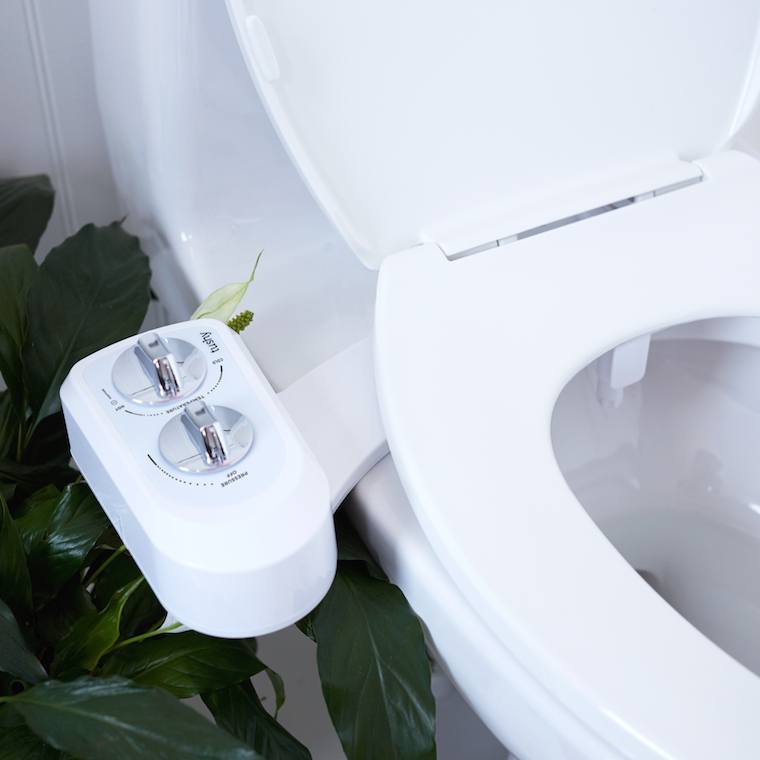That's mainly because, in the US at least, talking about the state of one's undercarriage is still more or less taboo. But that's starting to change: Squatty Potty has given us a hilarious—and highly Instagrammable—education in the prime position for pooping, devices like Elvie are making pelvic floor training as addictive as a workout (and promoting better bowels in the process), and now, one company is aiming to make the bidet as indispensable to the millennial set as coconut oil and crystals.
If you haven't ever used a bidet, you're in the majority. It's either a standalone bowl or a device that connects to your toilet and cleanses your nether regions with a burst of water after you do your business. They're not very common in North America (fancy hotels excluded), but are actually quite prevalent in countries like Japan, India, and certain parts of Europe. Yet Tushy—cute, right?—is trying to convince us that every bathroom needs one, and that the state of our health is dependent on it.
Are bidets essential for optimal wellness? Here's everything you need to know about the so-called butt bestie.
The bidet revolution is upon us
Tushy is a new bidet from the makers of Thinx—you know, those period-proof panties. (Bodily functions are clearly their jam). At $59 it's pretty affordable, and it doesn't require any plumbing wizardry to install. The process is so easy, in fact, I watched a colleague attach a Tushy to the W+G toilet in under ten minutes.

{{post.sponsorText}}
It all started when founder (admitted holistic health detective) Miki Agrawal experienced bidets in Japan and India, and realized that American toilet systems haven't really changed since the 1800s.
"Bidets aren't as common as they should be," says Elliot Friar, content and social manager at the company. "Tushy is trying to make them ubiquitous in [American] toilet culture."
So what's wrong with toilet paper or wet wipes, exactly? As Friar explains, bidets give you a deeper, more thorough clean: "If a bird poops on you, you wouldn't take a dry piece of paper and wipe—you'd wash it off. So why treat your butt any different?" He's got a point.
Not only is toilet paper ineffective, but it's also creating a mess of the environment. In the US, each person uses an average of 57 sheets of toilet paper a day. It takes 37 gallons of water to produce one roll of toilet paper, and 15 million trees are cut down annually for toilet paper, according to stats compiled by Tushy. Oh, and wet wipes are even worse: Friar points out that though they may claim to be flushable, they're clogging sewage systems and costing your city lots of money to clean up ($10 million a year in NYC alone, he says).
Hence, the splash from a bidet is not only good for your underparts, but for the earth as well. Talk about double duty (doody?).

Real talk: The consequences of poor wiping
Inefficient wiping isn't just gross in theory; if you don't thoroughly clean yourself post-poo, experts say you run the risk of getting some pretty undesirable health problems.
"Hemorrhoids are a big one, and these occur in people of all ages," says John Cluley, M.D., a Texas-based gastroenterologist. And that's not all. "Anal fissures can develop, and toilet paper is not beneficial for that. Pruritus ani is essentially itchy butt, and that can come from poor hygiene. And women are prone to getting a UTI if that area is not properly cleaned. If you're a healthy person in general and you have poor butt health, any of those conditions can develop out of nothing." He goes on to say that dry toilet paper just exacerbates these issues by irritating the sensitive area further.
And according to Allen Kamrava, M.D.—a colorectal surgeon at Cedars-Sinai—bidets are especially crucial for those with irritable bowel syndrome. In an interview with Yahoo!, he claims they're key for keeping the good bacteria where they belong and maintaining the area's natural oils, which break down if you use dry toilet paper.
Bottom line, says Dr. Cluley: "Wiping without using your hand is best. Bidets get rid of the rubbing and spreading, and get you as clean as you should be."
It's hard not to be convinced by that argument. But if you're still hesitant to jump on the bidet bandwagon, consider this: Tushy also gives back to those with poor sanitation (or no toilets at all) through a partnership with Samagra, an organization that provides clean toilets to families in developing countries. Consider it a feel-good addition to your wellness routine, in more ways than one.
No buts about it: Your booty deserves some love. Try these cheeky moves celebs love for toning their glutes. And here's what your buns can tell you about your skin health.
Loading More Posts...